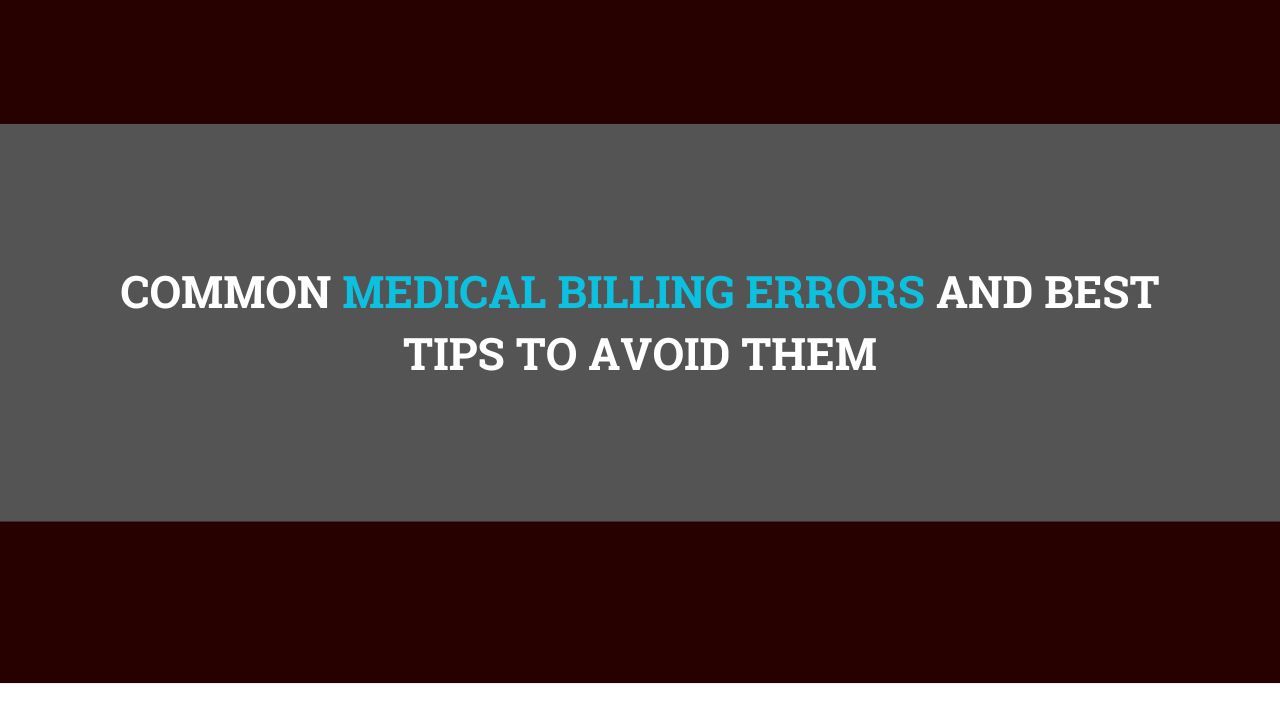Mistakes in medical billing often happen due to basic errors like not checking eligibility beforehand, typos, or entering data incorrectly. Unfortunately, even a simple mistake can cause significant delays in getting paid for healthcare services. Missed payments can seriously impact the financial health of a healthcare facility, relying on a steady stream of reimbursements. Health practitioners and coders must prevent these errors proactively and communicate effectively with their teams.
When dealing with medical bills, avoiding errors in processing or coding when submitting claims is essential. Since healthcare providers rely heavily on successful claim processing for their income, any mistakes can substantially impact you and your employer.
Avoiding Mistakes in Medical Billing: 5 Common Errors
Learn how to prevent common medical billing mistakes with these simple steps. You can do it with careful coding practices and updated knowledge. Plus, healthcare providers must sort out the real causes hindering constant revenue flow. To know the real causes of revenue, healthcare providers conduct regular healthcare audits by themselves or contact outsourced medical auditing companies. By following these steps, healthcare providers reduce the chances of rejecting or denying claims.
Verify Patient Identity
A frequent error is entering the wrong patient ID number. If the front office staff or the billing software makes a mistake, it falls on the medical biller to fix and resubmit rejected claims. Save time and avoid future issues by double-checking patient eligibility and ensuring accurate insurance ID numbers
Mixing Up Numbers
Mistakes like flipping numbers are common. Swapping two digits by accident, like in an ID number, can cause your claim to be rejected. This simple error can seriously slow down insurance processing and payments. Double-check all the numbers, especially birthdates, before submitting your claims!
Sending Claims to the Wrong Insurance
Sending a claim to the wrong insurance company is a big but avoidable mistake. It often happens when you don’t have a copy of the insurance card or don’t pay attention when entering patient details. To prevent this, ensure you have a copy of the insurance card, check both sides and confirm the correct insurance information in the practice management system.
Issues with Diagnosis and Procedure Codes
Codes for diagnoses and procedures get updated regularly. So, a rule you’re billing today might change or get removed. If you deny an invalid code, your billing claim could be instantly rejected. To avoid this, make sure your coding books are up-to-date, and review your commonly used codes each year to catch any changes.
Importance of Code Linkage
In simple terms, code linkage connects your diagnostic code to your procedure code, showing that your treatment matches your condition. This is crucial for proving medical necessity and getting paid for the procedures. Your claim won’t be accepted if the code connection doesn’t indicate medical need. Knowing your diagnostic and procedure codes well helps you spot these connections, preventing costly mistakes on claims that should be paid.
Preventing Mistakes in Medical Billing and Coding
With over 100 years of combined experience in healthcare, including various-sized hospitals and anesthesiology practices, Healthcare billing companies provide personalized solutions and close relationships, setting us apart from large medical billing companies. Our team comprises the nation’s top medical billers, leveraging global resources to deliver top-notch medical billing and revenue cycle management.
We strive for unmatched professionalism and analysis, dedicated to helping any medical practice achieve financial success. Here are ways to prevent billing and coding errors and simplify your life by streamlining the revenue cycle, reducing risk, and boosting collections.
Make Sure Patient Info is Accurate and Matches the Data
When running a medical office, errors can happen if a biller is not cautious. Missing or wrong patient details, like names, addresses, birthdates, gender, insurance info, and treatment dates, might lead to claim rejection. Busy billing teams might miss these crucial points.
To prevent mistakes, take a moment to review and confirm every piece of information about a patient before sending a claim.
Avoid Upcoding
Upcoding happens when the person coding medical procedures reports one that gets more money than the patient’s. For example, if a technician does a test, it gets coded as if a doctor did it. This can be a mistake when the billing team puts in the codes for diagnosis and treatment or the worker does not understand what the doctor said. It’s a problem because some codes mean more revenue, and this can make your earnings look higher than they should be. Upcoding doesn’t just lead to claim denials; it can also make your practice go through an audit or get penalties.
Stay Updated on Coding Guidelines
Medical coding rules change often. If you’re using an old manual, your claim might get rejected, affecting your payment. Coders need to be current with the latest billing rules. Get the newest coding manuals and attend seminars for updated coding strategies. Staying on top of codes ensures smooth claim processing and timely revenue.
Watch Out for Duplicate Billing
Double billing happens when a patient is charged multiple times for one procedure. This error can lead to denied claims, payment delays, and a damaged reputation. It might even trigger a fraud investigation. Large data volumes and disorganization during claim submissions can cause this mistake. To avoid it, conduct audits to reduce errors. Chart audits help catch and prevent these errors
Get Professional Help
Medical billers are responsible for keeping practices on solid financial ground by maintaining a reliable and efficient system for processing insurance claims. It is not an easy job. Medical billers constantly face challenges, from getting claims rejected to having to dispute them. But when you place the responsibility of your billing and revenue cycle management on yourself or your employees, you are not only adding to the stress at work but also increasing the likelihood of medical billing mistakes, resulting in loss of income. However, partnering with medical billing services always results in a return on investment.
Final Thoughts
Medical billers play a crucial role in preventing fraud and medical billing mistakes. Review patient records with your provider if you spot mistakes or suspect fraud. Billers can be responsible for errors that lead to fraud charges, fines, or even prison. Stay vigilant!



